KE Spotlight
Filter
-
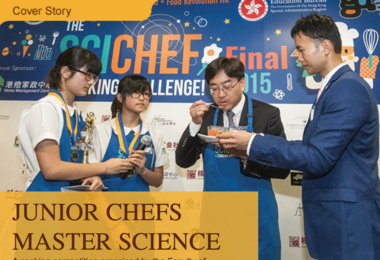
Junior Chefs Master Science
A cooking competition organised by the Faculty of Science encouraged junior secondary school students to apply scientific principles in their daily lives. Dr Benny Ng of the Faculty led the SciChef Cooking Challenge, in which junior secondary school students had to select a recipe, find a way to improve it, explain the science behind their efforts to a panel of judges, and cook up the dish. Through this competition, the students learned to relate science to their daily lives.
Read More -

HKU Swire Institute of Marine Science helping local oyster industry
The Hong Kong Oyster (Crassostrea hongkonggensis) is tasty and highly nutritious and has also helped to clean and enrich our deep bay waters, yet the local oyster industry is under threat. Dr V Thiyagarajan of the Swire Institute of Marine Science (SWIMS), led a programme to get the public involved through workshops and hands-on training aimed at raising public awareness and use technology to help local growers. The programme was funded by the HKU Knowledge Exchange Fund and the Agriculture, Fisheries and Conservation Department.
Read More -
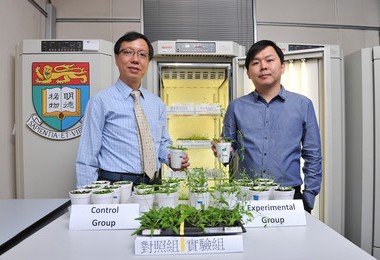
HKU botanists discover a new plant growth technology that may alleviate climate change and food shortage
A research team led by Dr Wallace Lim Boon-leong with his former student Dr Law Yee-song at the HKU School of Biological Sciences has developed a new strategy to promote plant growth and seed yield by 38% to 57% in a model plant Arabidopsis thaliana, hence increasing CO2 absorption from the atmosphere. The researchers have identified a plant-growth promoting gene, designated as "Purple acid phosphatase 2"(AtPAP2) from the model plant Arabidopsis thaliana. AtPAP2 can modulate the import of a number of specific proteins into chloroplasts and mitochondria, and subsequently boost their capability to harvest solar energy and generate adenosine triphosphate. The technology may also have potential in boosting food production to address the problem of food shortage due to overpopulation. Several patent applications have been filed with the assistance of the University's Technology Transfer Office.
Read More -
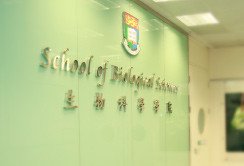
HKU scientists found Hong Kong coral reef thriving despite pollution
A research team led by Dr David Baker of HKU's School of Biological Sciences found that marine life is thriving despite serious pollution caused by major developments at Hong Kong's busy harbour. The stronger types of coral species are holding on despite the unrelenting conditions, and the scientists are studying how they survive, which may offer hope to habitats under threat globally in the future.
Read More -
Knowledge Exchange Awards 2015
The Faculty Knowledge Exchange (KE) Awards were introduced in 2011 in order to recognize each Faculty’s outstanding KE accomplishment that has made demonstrable economic, social or cultural impacts to benefit the community, business/industry, or partner organizations. Results of the 2015 Faculty KE Awards are now available.
Read More -
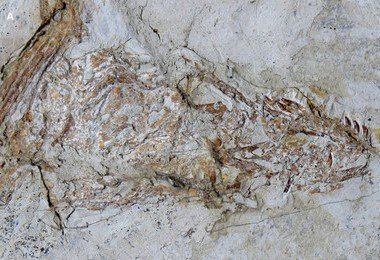
HKU earth scientist collaborates with international experts to develop new laser-induced fluorescence techniques to uncover never-before-seen details in fossils
HKU Department of Earth Sciences' Vertebrate Palaeontology Laboratory Head Dr Michael Pittman has developed, together with eight international colleagues, a simple new technique to analyse fossils. The technique, called laser-stimulated fluorescence (LSF), utilises lasers to stimulate fluorescence in fossils that normally do not fluoresce under standard UV lighting, with the new view photographed through a camera lens. Each colour of laser emits a different wavelength of light, which excites the minerals that make up a fossil in different ways. LSF provides an instantaneous, non-invasive, geochemical fingerprint of fossilised bone, soft tissue, integument and the surrounding rock matrix. The ability to look for hidden specimens in a fossil's rock matrix used to be only possible using X-rays, CT scans and other high-cost imaging methods. With LSF, researchers can set up a basic station quickly and for around HK$4000.
Read More -
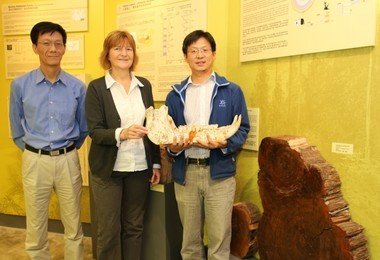
HKU Stephen Hui Geological Museum launches exhibition to showcase 65 million years of climate change
The HKU Stephen Hui Geological Museum launched a permanent exhibition on "Cenozoic Climate Change" on Earth Day (April 22, 2015) to trace the history of climate change back 65 million years to the start of the Cenozoic Era – the advent of the age of mammals, which continues into the present. On display are a range of paleoclimate "proxies", from 3,000 year-old tree rings and marine sediments to fossilised marine micro-organisms and mammals, all of which serve as organic "records" of the planet's climatological past. According to Professor Zong Yongqiang of the HKU Department of Earth Sciences, a look into the earth’s Cenozoic past will reveal short-term "abrupt climate changes" when temperature and CO2 levels rise rapidly, sometimes causing highly disruptive effects including extinctions of certain species. Carbon dioxide concentrations have risen steeply since the beginning of the industrial revolution, which should be alarming to people that climate change should be taken seriously and that the climate could respond in an abrupt and unexpected way.
Read More

